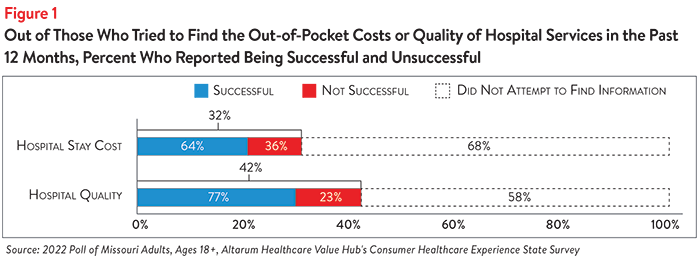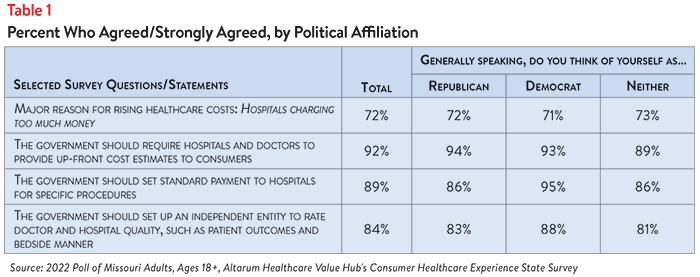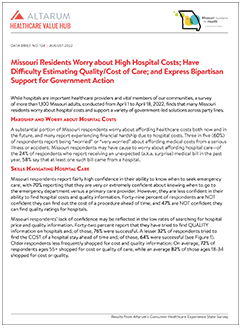Missouri Residents Worry about High Hospital Costs; Have Difficulty Estimating Quality/Cost of Care; and Express Bipartisan Support for Government Action
While hospitals are important healthcare providers and vital members of our communities, a survey of more than 1,100 Missouri adults, conducted from April 1 to April 18, 2022, finds that many Missouri residents worry about hospital costs and support a variety of government-led solutions across party lines.
Hardship and Worry about Hospital Costs
A substantial portion of Missouri respondents worry about affording healthcare costs both now and in the future, and many report experiencing financial hardship due to hospital costs. Three in five (60%) of respondents report being “worried” or “very worried” about affording medical costs from a serious illness or accident. Missouri respondents may have cause to worry about affording hospital care—of the 24% of respondents who report receiving an unexpected (a.k.a. surprise) medical bill in the past year, 58% say that at least one such bill came from a hospital.
Skills Navigating Hospital Care
Missouri respondents report fairly high confidence in their ability to know when to seek emergency care, with 70% reporting that they are very or extremely confident about knowing when to go to the emergency department versus a primary care provider. However, they are less confident in their ability to find hospital costs and quality information. Forty-nine percent of respondents are NOT confident they can find out the cost of a procedure ahead of time, and 47% are NOT confident they can find quality ratings for hospitals.
Missouri respondents’ lack of confidence may be reflected in the low rates of searching for hospital price and quality information. Forty-two percent report that they have tried to find QUALITY information on hospitals and, of those, 76% were successful. A lesser 32% of respondents tried to find the COST of a hospital stay ahead of time and, of those, 64% were successful (see Figure 1). Older respondents less frequently shopped for cost and quality information: On average, 72% of respondents ages 55+ shopped for cost or quality of care, while an average 82% of those ages 18-34 shopped for cost or quality.

Although many of the respondents who seek out hospital price and quality information are ultimately successful in finding it, respondents have low confidence in their ability to find price and quality information, and the majority of respondents never attempt to find this information at all. This could be due to a variety of factors, including that this type of information is not easily accessible, despite federal price transparency mandates for hospitals.1 It could also stem from the fact that some consumers don’t view healthcare as a shoppable commodity, especially in emergency situations and settings that lack a selection of treatments/providers. Additionally, price may not the most important factor in healthcare decisions. For example, many patients defer to the courses of treatment their doctors recommend. Lack of knowledge of hospital quality and potential costs impedes Missouri residents’ ability to plan for needed care and budget for the expense of a hospital stay, which can be costly,2 particularly for residents who are un- or under-insured.
Support for “Fixes” Across Party Lines
Hospitals, along with drug manufacturers and insurance companies, are viewed as primary contributors to high healthcare costs. When given more than 20 options, Missouri respondents most frequently cited the following options as being a “major reason” for high healthcare costs:
- 75%–Drug companies charging too much money
- 72%–Hospitals charging too much money
- 66%–Insurance companies charging too much money
- 56%–Large hospitals or doctor groups using their influence to get higher payments from insurance companies
Missouri respondents strongly endorse a number of hospital-related strategies, including:
- 92%–Require hospitals and doctors to provide up-front cost estimates to consumers
- 89%–Set standard payment to hospitals for specific procedures
- 84%–Set up an independent entity to rate doctor and hospital quality, such as patient outcomes and bedside manner
- 60%–Pay doctors and hospitals a fixed monthly fee per patient, instead of payment for each service
What’s even more interesting is the level of support for some of these strategies across party lines (see Table 1).
Conclusion
The findings from this poll suggest that Missouri respondents are somewhat motivated when it comes to searching for hospital cost and quality information to help inform purchasing decisions and plan for a future medical expense. However, Missouri respondents searched for hospital cost information less than other services, and they were less successful at finding hospital costs than other services, despite recent action at the federal level to make hospital prices more transparent.3,4
It is not surprising that most Missouri respondents express strong support for government-led solutions to make price and quality information more readily accessible and to help consumers navigate hospital care. Many of the solutions respondents support would take the burden of research and guesswork off of consumers’ shoulders, by standardizing payments for specific hospital procedures, requiring hospitals and doctors to provide consumers with cost estimates for certain procedures and establishing an entity to conduct independent quality reviews. Policymakers should investigate the evidence on these and other policy options in order to respond to Missouri respondents’ bipartisan call for government action.
Methodology
For the complete methodology, please see Missouri Residents Struggle to Afford High Healthcare Costs; Worry about Affording Healthcare in the Future; Cite Unfair Prices Charged by Powerful Industry Stakeholders; Support Government Action across Party Lines, at www.healthcarevaluehub.org/Missouri-State-Survey.
Notes
1. As of Jan. 1, 2021, the Centers for Medicare and Medicaid Services (CMS) requires hospitals to make public a machine-readable file containing a list of standard charges for all items and services provided by the hospital, as well as a consumer-friendly display of at least 300 shoppable services that a patient can schedule in advance. For more information, see: https://www.cms.gov/hospital-price-transparency/hospitals
2. According to Health Forum, an affiliate of the American Hospital Association, hospital adjusted expenses per inpatient day in Missouri were $2,668 in 2020—just below the national average. See: Kaiser Family Foundation, State Health Facts Data: Hospital Adjusted Expenses per Inpatient Day. Accessed June 10, 2022.
3. This survey was conducted after the Centers for Medicare and Medicaid Services’ rule requiring hospitals to publicly display all standard charges for all items and services, as well as shoppable services, in a consumer-friendly format went into effect. While survey respondents may be reflecting on their experiences before the rule went into effect, the well-documented low compliance from large hospitals indicates that the rule has yet to demonstrate the desired effect. See: Kurani, Nisha, et al., Early Results from Federal Price Transparency Rule Show Difficulty in Estimating the Cost of Care, Kaiser Family Foundation, (April 9, 2021). See also: Henderson, Morgan, and Morgane C. Mouslim, “Low Compliance from Big Hospitals on CMS’s Hospital Price Transparency Rule,” Health Affairs Blog (March 16, 2021).
4. Missouri Residents Experience Difficulty Estimating the Cost and Quality of Care; Express Bipartisan Support for Government Action, Healthcare Value Hub, Data Brief No. 123 (August 2022).








